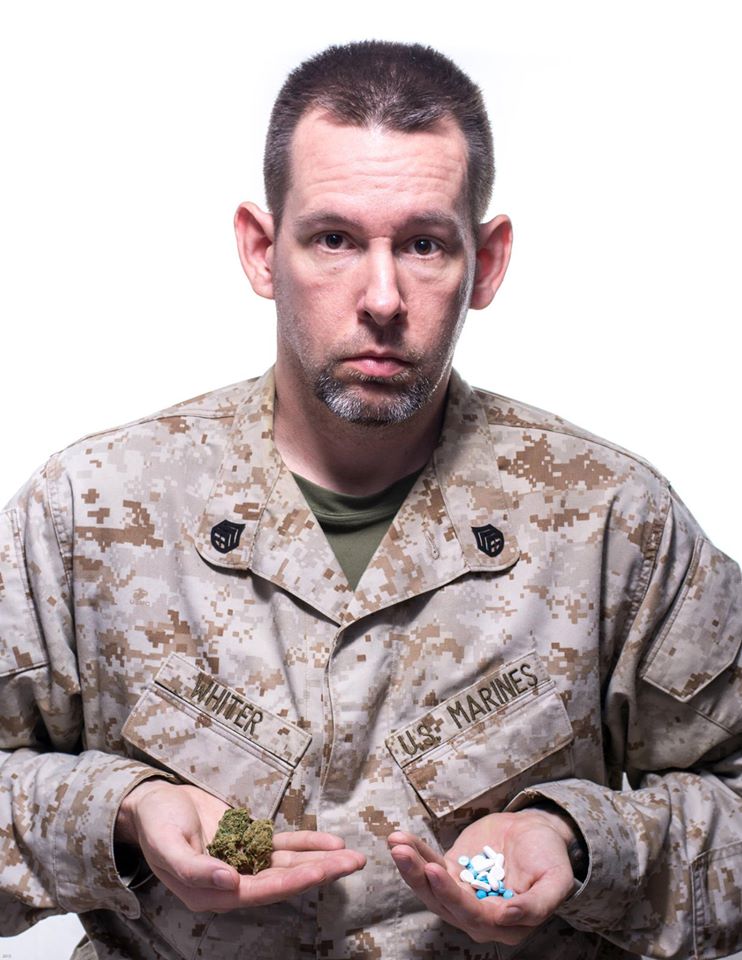TORONTO – For five years, the biggest challenge in United States Marine Corps Staff Sergeant Mike Whiter’s life was simply finding the will to step out his front door.

Medically discharged from the Marines in 2006 as a result of Post-Traumatic Stress Disorder (PTSD), he says nothing prepared him for life back home, or for how “messed up” he would become as a result of his PTSD – or the many medications he was prescribed by Veteran’s Affairs (VA).
“I sat on the chair, and watched TV. I showered, once in a while,” Whiter told Global News from his home in Philadelphia, Pennsylvania. “I was just depressed. I wanted to die.”
Today, the 39-year-old art student at the Art Institute of Philadelphia says he’s in a much brighter place in his life, and he knows exactly why that is.
“I truly believe cannabis saved my life.”
It’s the subject of a campaign Whiter started called #OperationOverMed, which looks to raise awareness of what Whiter says is the over-medication of injured and traumatized vets.
The subjects of Whiter’s photos are veterans, including himself, who have been prescribed a multitude of medications since being discharged from the military.
Their personal stories are shared along with the photos. In some cases, the subject is seen holding a bud of marijuana, highlighting what Whiter says is an alternative to prescription medication.
READ MORE: Gallery of portraits features Calgary first responders with PTSD
“When I got out of the Marine Corps, the VA put me on over 40 different medications,” Whiter said. “When I went to see them about chronic pain in my neck, their first choice was Methodone. And I was on Klonopin as well, which is a Benzodiazepine.”
Organizations like the Centre for Addiction and Mental Health warn against mixing Methodone and Benzodiazepines, saying the combination is capable of causing impaired breathing, heart failure, or death.
According to Whiter, it’s also the combination addicts who are on Methodone treatment use to get a similar high to heroin.
Whiter joined the Marine Corps “on a bet” when he was 19 years old. Over the course of his 11 year military career, he served in Kosovo and did combat tours in Iraq as part of Operation Iraqi Freedom, serving with the 2nd Battalion, 10th Marine regiment.
At one point, he was assigned to the security detail at the infamous Abu Ghraib prison west of Baghdad, a short time after the initial scandal involving prisoner abuse and torture had broken in the western media.
But his service came with a cost. Whiter says he began battling depression, “isolating himself” and acting out. His performance as a Marine began to suffer. And once he decided to consult a psychiatrist, he says his unit “ostracized” him as a result.
“My unit put me in charge of a pistol range with guns and ammo when I was suicidal,” Whiter said. “They literally gave me the gun.”
READ MORE: Veterans’ lawsuit against feds on hold until after election
He was medically discharged from the Marines in 2006 with what the Corps classified as a “personality disorder.” It wasn’t until he consulted a VA doctor that he was diagnosed with PTSD.
What followed was five dark years where Whiter was consumed by prescription pills and a struggle to find meaning in his life.
It wasn’t until 2012, when a documentary opened his eyes to the possibilities of medical cannabis.
Since he started #OperationOverMed, Whiter has been overwhelmed not just by the positive feedback, but by how closely the stories of so many veterans mirrors his own.
“It’s incredible how many people have reached out to me and it sounds like they’re giving me my autobiography,” Whiter said. “That’s the story I really want to tell, a story that I hope is helping people.”
Specialist Therèsè Carrozzino is one of the subjects of Whiter’s photographs. She says she used to take a combination of nine different medications each day before switching to cannabis to help medicate her PTSD.
“Natural is the best route to take,” Carrozzino said. “I’d rather live than be a zombie.”
However, a key part of #OperationOverMed’s message is that cannabis alone isn’t a miracle cure-all that can replace prescription medication, or therapy, in every case.
“I want to highlight therapy,” said Corporal Barrett Thompson, another of Whiter’s subjects. “Continuous therapy and self healing is the key – not just smoking cannabis.”
READ MORE: Large study says U.S. medical marijuana laws don’t foster teen use
In the end, Whiter says his campaign is about raising awareness among veterans that alternatives exist.
“I just want them to know there are options beyond the VA’s pills.”
A big part of that activism involves changing the rules regarding marijuana use in his home state of Pennsylvania, where the practice is currently forbidden.
“I’m breaking the law every time I use cannabis,” Whiter said. “I’m actually a bit jealous of you guys up in Canada.”
Medical marijuana was legalized in Canada in March of 2014. Earlier this month, the Supreme Court ruled that medical marijuana can be legally consumed in a range of ways, from cannabis-infused cookies and brownies to cooking oils and teas.
#OperationOverMed runs until the first week of July, by which time Whiter says he hopes to have enough photographs – and stories – to publish an #OperationOverMed photo journal, which he hopes to sell in stores.
You can check out more of Whiter’s work on his Facebook page, or on his personal website.






Comments